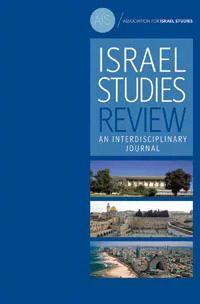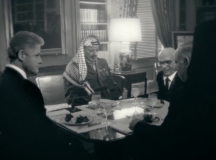Oded Haklai introduces the new issue of the journal Israel Studies Review. Thirty years since the signing of the Oslo Accord, ISR offers fresh analyses of what went wrong.
September 13, 2023 will mark 30 years to the signing of the Declaration of Principles on Interim Self-Government Arrangements, commonly known as the Oslo Accord, on the lawn of the White House. Intended to pave the path for Israeli-Palestinian peacemaking, the accord signing was greeted with widespread optimism. Three decades later, the conflict is as intractable as ever; the initial sanguinity replaced by prevalent resignation of ‘no end in sight.’
To mark the thirtieth anniversary of the Oslo Accord, the Israel Studies Review, the flagship academic journal of the Association of Israel Studies (the largest international scholarly association dedicated to the study of Israel) has published a special issue, guest co-edited by Menachem Klein, Professor Emeritus of political science at Bar Ilan University, and Raffaella A. Del Sarto, Associate Professor of Middle East Studies at the Johns Hopkins School of Advanced International Studies Europe, Bologna. The articles in the special issue generally eschew the now all too common apportioning of blame approach to the failure of the peace process and, with the benefit of hindsight, try to offer fresh analyses with a broad overview on what went wrong and what happened since.
On the basis of fascinating interviews conducted for his doctoral research in the School of Government, University of Birmingham, David Wilcox suggests that one main reason the Oslo negotiations were made possible in the first place was the interpersonal trust that was developed between the negotiators behind the scenes, primarily Dr. Yair Hirschfield and Uri Savir, on the Israeli side, and Ahmed Qurei (Abu Ala), on the Palestinian side. In contrast, in the parallel overt process that took place at the time, the Washington negotiations, no interpersonal trust developed between the negotiators. The problem that would emerge for the implementation of Oslo was a decisive lack of interpersonal trust among key individuals. Ultimately, the implementors were not the same people who negotiated Oslo, but rather officials and leaders. The paradox, therefore, is that Oslo was largely made possible because it was a ‘track II’ channel (unofficial negotiations), yet it failed because the interpersonal trust the enables truck II initiatives in the first place was not transferred to the official level.
Fride Lia Stensland offers a fresh perspective on the role of Norway. Identifying how unusual it is for a relatively small state to facilitate such a big diplomatic breakthrough, Stensland provides a comprehensive account of Norway’s role. She explains how it may have been precisely the absence of diplomatic clout that enabled the Israelis and Palestinians to converse under Norwegian auspices (without fear of negative repercussions if the talks failed). On the flip side, the limitation of Norway’s meager diplomatic resources meant it was not able to offer credible solutions to the big structural obstacles. Along similar lines, Nir Levitan’s article provides a detailed account of Denmark’s mediation efforts in the aftermath of the Oslo Accord. Levitan, a research fellow at the Bar-Ilan Europa Institute uncovers the barely recorded and underestimated contribution of Norway’s Scandinavian neighbour. Particularly fascinating is the Copenhagen Initiative, also referred to as the ‘Louisiana Process’, informal talks between the Israelis and Palestinians that Denmark sponsored. The article further uncovers Denmark’s indispensable contribution to the formation of the Roadmap to Peace during its presidency of the Council of the European Union.
Two articles analyse domestic attitudes in Israel through the lens of 3 decades. Arik Rudnitzky, Project Manager of the Konrad Adenauer Program for Jewish-Arab Cooperation at the Moshe Dayan Center for Middle East and African Studies at Tel Aviv University, provides an overview of the changing debate about the Oslo process amongst the Palestinian Arab citizens of Israel – a community that is far from monolithic. Some within this community view the period of the Oslo Accord as the Golden Era of the Arabs in Israel. Palestinian nationalists, on the other hand, have always been (and remain) critical of both the accord for excluding the Palestinian citizens of Israel. The Islamists received the accord with mixed reaction but gradually became more critical as the process stalled.
Stacey Gutkowski, Reader in Peace and Conflict Studies at King’s College in London, provides an interesting analysis of the Jewish-Israeli secular millennials (born 1980-1995). The formative experience of this generation has been constituted by the collapse of the peace process and the accompanying recurring violence. She characterises the impact of these experiences on this generation as generating ‘hope-as-waiting’ attitudes, meaning pessimism about the prospects of resolving the conflict coupled by a pervasive belief (including among those on the political left) that Israel’s continued control of the West Bank will have to regrettably continue. Also examining Jewish-Israeli perspectives, Marcella Simoni of the University of Venice uses two films by Amos Gitai as lenses through which to identify diverse moods in different periods of time over the past 3 decades.
The last two articles shift the lens to international factors. Leonie Fleischmann provides an encompassing overview of multiple discursive shifts by the human rights community in the region over the past 3 decades, manoeuvring between competing objectives, diverse constraints, and changing conditions. Finally, Yaron Salman from Ben Gurion University looks at the impact of the Oslo process on Israel’s foreign relations with African states. His article shows how, on the one hand, the peace process paved the way for growth in diplomatic relations with many countries on the continent. On the other hand, most of these relations have not transcended far beyond security cooperation, trade, and aid into the civilian realms. Diplomatically, Israeli hopes that aid would yield more favourable voting patterns in the UN have not materialised.
There is little dispute that the intention behind the Oslo Accord was positive. Even with the benefit of a 30-year hindsight, analysts remain disputed about what went wrong and why. Against this background, the Guest Editors are unsurprisingly unable to offer a cause for optimism about paths forward.




































